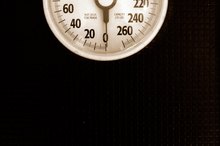How to Calculate Body Fat Into Pounds
Excess body fat, especially around your middle, is linked to health conditions including type-2 diabetes, certain cancers, stroke, hypertension, heart disease and reproductive problems. To gauge whether you're susceptible to any of these health risks, determine how much body fat you have. Obtaining your body fat percentage is easily done with store-bought, handheld calipers or electrical impedance meters. Once you have your body fat percentage, determining how much your body fat actually weighs is simple.
Obtain your overall weight by standing on a scale. For the most accurate results, get on the scale first thing in the morning before you've had anything to eat.
How to Figure Out How Much Percentage of Body Fat to Lose
Learn More
Use a body fat analyzer or caliper to calculate your current body fat percentage. They will both require your age, gender and height for an accurate estimate of total body fat.
- Excess body fat, especially around your middle, is linked to health conditions including type-2 diabetes, certain cancers, stroke, hypertension, heart disease and reproductive problems.
- To gauge whether you're susceptible to any of these health risks, determine how much body fat you have.
Multiply your scale weight by your body fat percentage. For instance, assume you weigh 180 lb. and your body fat percentage is 25 percent. Multiply 180 and 0.25 to get a total of 45 lb. of total body fat.
Tips
Measure your waist circumference for a quick gauge whether you're at risk of health conditions. If it's 35 inches or more, you're at an increased risk.
Related Articles
References
- Shape Up America!: Body Fat and Health Risks
- ACE Personal Trainer Manual; American Council on Exercise
- Aquatic Fitness Professional Manual; Aquatic Exercise Association
- Bryant CX, Green DJ, Newton-Merrill S. ACE Health Coach Manual: the Ultimate Guide to Wellness, Fitness, and Lifestyle Change. American Council on Exercise, 2013.
- Centers for Disease Control and Prevention. About adult BMI. Updated April 10, 2020.
- National Heart Lung and Blood Institute. Assessing your weight and health risk.
- National Institute of Diabetes and Digestive and Kidney Diseases. Understanding adult overweight and obesity. Updated February 2018.
Writer Bio
Kendra Crawford has been publishing articles since 2010. She is the manager of a health club as well as a personal trainer and instructor. She has a Bachelor of Science in sports management from Florida State University and is pursuing a doctoral degree in physical therapy at the University of Florida.






